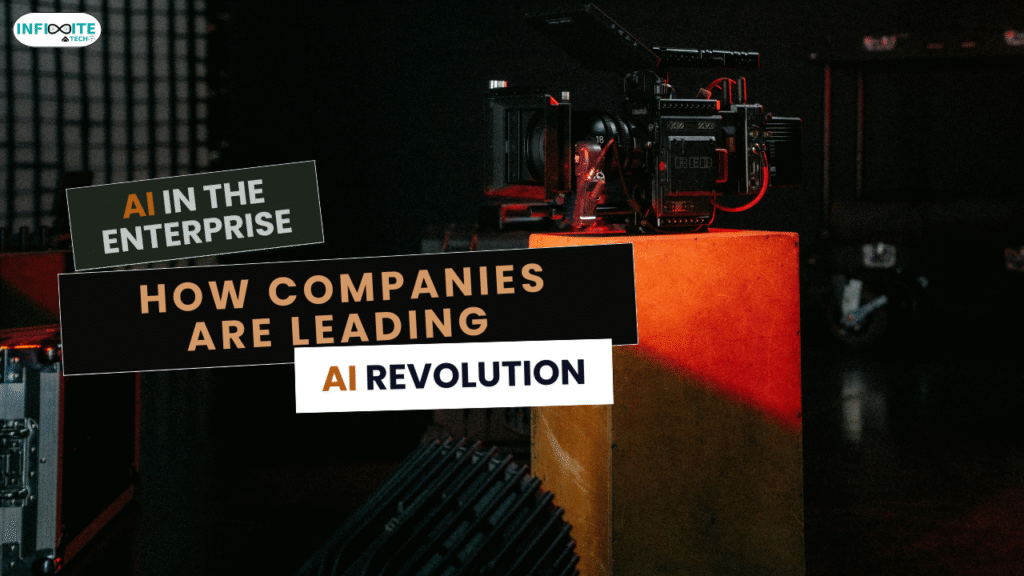
AI in the Enterprise: How Companies Are Leading the AI Revolution
Artificial Intelligence (AI) is no longer a buzzword—it’s a transformative force reshaping industries, driving innovation, and unlocking new opportunities. In 2025, AI adoption has surged across sectors, with 78% of global companies integrating AI into their operations. Exploding Topics From large enterprises to startups, organizations are leveraging AI to enhance efficiency, personalize customer experiences, and accelerate decision-making.
The AI Surge in Business
The rapid adoption of AI is evident across various industries. In the healthcare sector, AI is revolutionizing diagnostics and patient care. In finance and fintech, AI algorithms are streamlining risk assessment and fraud detection. Manufacturers are utilizing AI for predictive maintenance and supply chain optimization. Retailers are enhancing customer experiences through personalized recommendations and chatbots. Even eco-conscious consumers are benefiting from AI-driven sustainability initiatives.
A notable example is Databricks, a data and AI analytics firm, which projects $4 billion in annual revenue for 2025, marking a more than 50% year-over-year increase. This growth is largely attributed to heightened demand for AI solutions, with AI-related revenues reaching $1 billion in the second quarter alone. Reuters
The Business Impact of AI
- AI as a Core Business Driver
AI is no longer confined to research labs or tech giants. Companies across sectors are embedding AI into their core operations. In the retail industry, AI is enhancing inventory management and demand forecasting. In education, AI-powered platforms are personalizing learning experiences for students. These applications demonstrate AI’s versatility and its potential to drive business growth. - The Role of Generative AI
Generative AI, capable of creating new content such as text, images, and code, is gaining traction in enterprise settings. According to a survey, 71% of organizations report using generative AI in at least one business function. Exploding Topics This technology is streamlining content creation, automating customer interactions, and enhancing product design processes. - AI Investment Trends
AI investment is booming globally. In 2024, U.S. private AI investment grew to $109.1 billion, nearly 12 times China’s $9.3 billion and 24 times the U.K.’s $4.5 billion. Stanford HAI This influx of capital is fueling innovation and enabling companies to scale their AI initiatives.
Why Embrace AI Now?
- Enhanced Efficiency and Productivity
AI automates routine tasks, analyzes vast datasets, and provides actionable insights, leading to improved efficiency and productivity. Companies leveraging AI for process automation have reported up to 37% productivity gains. Box - Competitive Advantage
Early adopters of AI are gaining a competitive edge by offering innovative products and services. For instance, AI-driven predictive analytics enable businesses to anticipate market trends and customer needs, allowing for proactive decision-making. - Scalability and Agility
AI enables businesses to scale operations efficiently. Cloud-based AI solutions provide the flexibility to expand resources as needed, ensuring that companies can adapt to changing market demands without significant infrastructure investments.
How to Lead the AI Revolution in Your Organization
- Develop a Clear AI Strategy
Align AI initiatives with business objectives. Identify areas where AI can add value, such as customer service, supply chain management, or product development. Establish measurable goals to track progress and ROI. - Invest in AI Talent and Infrastructure
Building a skilled workforce is crucial. Invest in training programs to upskill existing employees and attract top AI talent. Additionally, ensure that the necessary infrastructure, such as data storage and processing capabilities, is in place to support AI initiatives. - Foster a Culture of Innovation
Encourage experimentation and collaboration. Create cross-functional teams to explore AI applications and share insights. Recognize and reward innovative solutions that leverage AI to solve business challenges. - Prioritize Ethical AI Practices
Implement guidelines to ensure that AI systems are transparent, fair, and accountable. Regularly audit AI models to identify and mitigate biases, and ensure compliance with data privacy regulations.
Summary
AI is transforming the enterprise landscape, offering opportunities for enhanced efficiency, innovation, and competitiveness. By developing a clear AI strategy, investing in talent and infrastructure, fostering a culture of innovation, and prioritizing ethical practices, organizations can lead the AI revolution and unlock its full potential.




